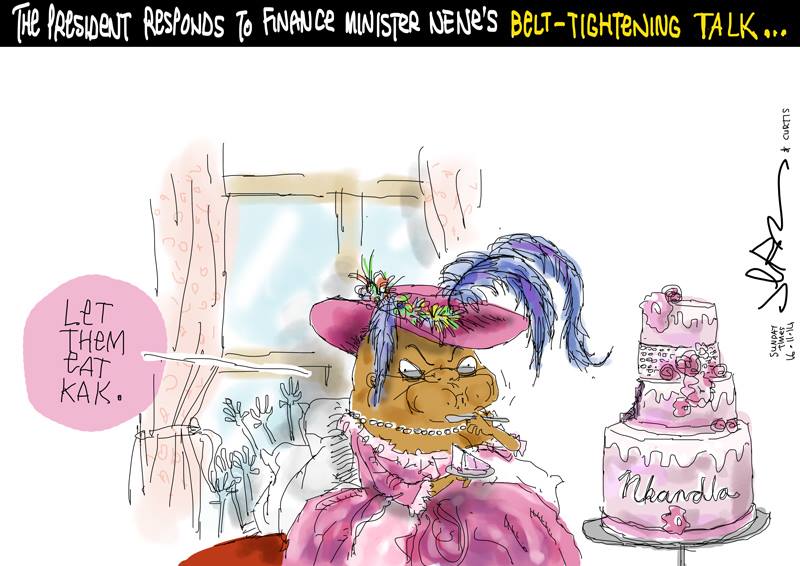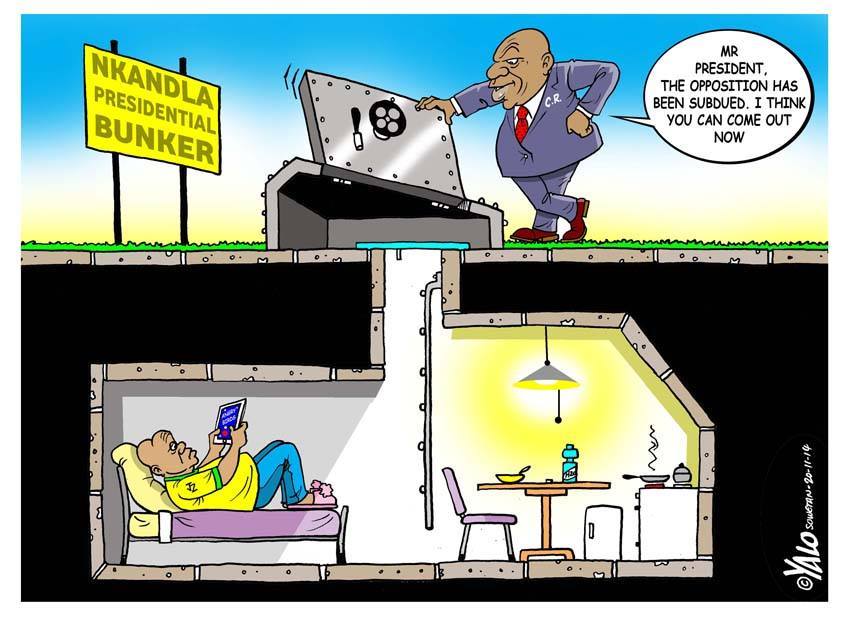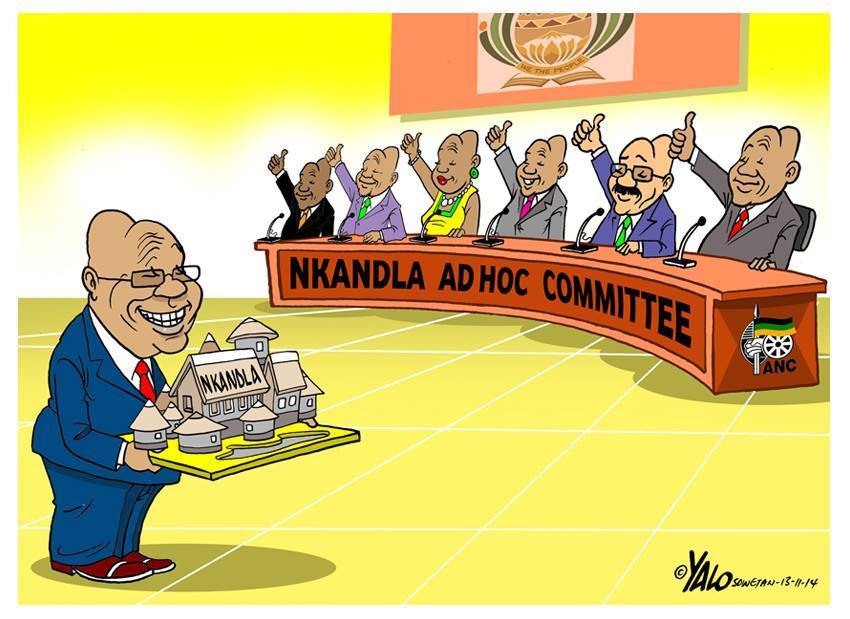A relatively minor detail has emerged in the Nkandla affair, but it holds several more significant conclusions and contradictions concerning President Jacob Zuma’s defence.
It is a small incident and is merely another piece of the puzzle but a powerful one. The implications are fairly profound and it needs to be viewed with a broader set of evidence.
Zuma’s — and the government’s — defence on the cost of upgrading security at his private residence at Nkandla has been that the decisions were made by officials, and their nature and scope beyond his control. He was merely an innocent bystander and by no means complicit in the decisions; they were, he argues, imposed on him.
Politically, this has allowed the government a "scapegoat defence", where it can acknowledge wrongdoing — errant officials and dysfunctional systems and protocols — but exonerate the president.
But the government suffers a credibility problem. To believe it, one would have to also believe the president, commander-in-chief of the country’s defence forces, either felt too intimidated to intervene or was oblivious to the scale of the upgrades and thus did not regard them or their cost as problematic.
This has been the main point of contention, politically and legally. Those who argue Zuma is culpable argue it is not plausible to claim he was unaware of the scale and therefore the cost, a criticism compounded by the fact that a number of the "security upgrades", for example the swimming pool, served no security purpose. They point to meetings with Zuma’s personal architect and members of government, and to the fact that, while at Nkandla over the course of the construction, Zuma must have seen what was happening.
One of the key questions is: what evidence exists that demonstrates Zuma had agency with regards to the security upgrades and was willing and able to intervene, which could have changed or influenced the final outcome?
For his defence to work, Zuma must have had absolutely no involvement. If he demonstrated any interest in the nature of the security upgrades, he would demonstrate agency and, in turn, culpability.
There is precious little on the public record from Zuma himself on this matter. His political handlers have steered him well clear of public interrogation and, aside from those parliamentary sessions where he provided a scripted answer to questions on the upgrades, he has had next to nothing to contribute; with one noticeable exception.
In his letter to the speaker of Parliament, required by Public Protector Thuli Madonsela in response to her report, the president states that, despite being briefed by those ministers in charge of the upgrades, he "was not intimately involved with the finer details".
Then the president notes an exception: "At these briefings I expressed concern with what appeared to be inordinately lengthy delays which impacted on my family. Equally I found some of the security features like the bulletproof windows an excessive encroachment on my use and enjoyment of my property."
This constitutes a significant contradiction.
What is the president referring to? There is one media interview in which Zuma discusses Nkandla in a meaningful way, an exchange with eNCA, on February 16 2014. In it, he elaborates on this point.
Five minutes and 18 seconds into the second half of the interview, Zuma states in response to the suggestion that he should have intervened: "So when, at what point should you debate? The only thing I debated was when I saw one of my bedrooms, one of my bedrooms, with one little window, like it was a cell. I said to them, ‘Look, I was in prison for 10 years, I can’t be in prison for life now in my home. This one, I cannot accept.’ Now, that’s the only thing. I was looking at it from a subjective point of view to say, how do I sleep in a bedroom, if I open a window I can’t see the outside because of security? I said no."
The president then explained he didn’t debate the changes. "I’m just saying, you don’t debate, you don’t ask, they impose security measures, that’s what it is."
But it was too late; the president had already given the game away. No doubt this was the reason he included reference to this incident in his letter to the speaker.
One small bedroom window pales in comparison with the other measures. It is a very minor detail. But it is all one needs to demonstrate that the president was both aware of the changes and their implications; and, more importantly, willing to intervene. Only that the reason for his intervention was the aesthetic value of the view from his bedroom, as opposed to how public money was being spent.
Later, the president is asked whether, had he been informed, he would have taken issue with the upgrades (nine minutes, three seconds), to which he replies by strongly denying he would have said anything anyway, on the grounds that he is no expert on security: "It is done by the state, for whatever they consider to be a security measure, I mean I would be debating it from an uninformed position." That defence, too, is rendered inconsistent by his attitude to his bedroom window. If aesthetics is reason enough to intervene, why not excessive spending?
From Zuma’s attitude to the bulletproof window in his bedroom, the following facts flow:
• He had a critical opinion on the appropriateness of the installation; in his view, a reasonable one.
• He expressed a clear and unequivocal reservation to those making the decision: "This one, I cannot accept" and "I said no". In his letter he describes them as an "excessive encroachment".
• Those security experts who would have advised otherwise did therefore not intimidate him on this issue. He had an opinion and he felt strongly enough about it to express it, with a view to it being enacted, whatever the security implications.
• Although the outcome of that reservation is unclear, the suggestion is his request was ceded to too. Had it not been, he would have used it to further illustrate his point that he had no control, as opposed to the opposite.
One could argue too that his dissatisfaction with the delays on the project likewise constitutes a reservation and an attempt to intervene. Given those facts, it becomes clear that the president had a view on the security upgrades, and was able to express it and expect those responsible to change the plan accordingly. It appears they did.
But even if the president’s reservations about the window were ignored, it still demonstrates he was able at least to register an objection. Zuma is at pains to point out during the interview that this was the only thing he "debated"; an admission that makes the raft of developments he did not take issue with all the more glaring and inexplicable. If he said no to the window, he could have said no to other "excessive encroachments".
And it is on this point Zuma’s defence is fundamentally compromised: the very inanity of his concern, the seeming insignificance of a bedroom window is rendered profound when weighed against the exorbitant cost and non-security-related expenses attached to so many other of the upgrades. His one petty concern reveals his profound and general ignorance with regards the others. But not so as regards his culpability. On this front, his concern confirms he was generally complicit.
As a metaphor, the government’s defence is akin to a colonel at an army base, his men supposedly looting without his authority. Yet he notices one thing and requests it be changed: that when pillaging, their shoes are not well polished and he insists they must be shiny. In doing so, he reveals both his general ignorance and his specific involvement. And he would be culpable for both.
It is an interesting thought to imagine what Zuma thinks when he looks through that window. As he takes in the scenery, does he wonder how limited the breathtaking view would have been had he not intervened? Does he commend himself for putting his foot down? If he does, it says something about the many remarkable contradictions Zuma is able simultaneously to hold in his mind. No doubt a different thought occupies his thoughts when he’s taking a swim.
-
BDLive
















